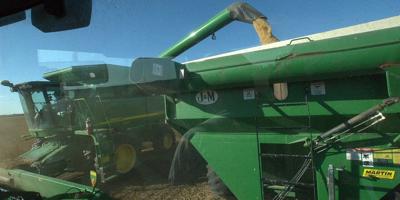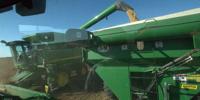
ROCKFORD, ILLINOIS - Deere & Co. can't cut off a legal action launched by federal regulators and several states, accusing the Moline-based agricultural equipment giant of allegedly violating antitrust laws by using proprietary software to corner the market on service and parts for its tractors, harvesters and other implements, a federal judge has ruled.
On June 9, U.S. District Judge Iain Johnston denied Deere's motion to dismiss the case filed against them by the Federal Trade Commission and five state governments, including Illinois.
The legal actions were launched in January 2025, just before President Donald Trump was inaugurated for his second term.
The FTC under then-President Joe Biden was joined in the action by Illinois Attorney General Kwame Raoul and his counterparts from the states of Wisconsin, Minnesota, Michigan and Arizona.
In the legal action, the FTC and states accuse Deere of violating federal and state antitrust laws by allegedly forcing farmers and other owners of Deere equipment to bring their machinery to Deere-authorized service centers for repairs and maintenance. This, in turn, allegedly allowed Deere to upsell farmers on more expensive Deere-branded parts.
Altogether, the actions claim the alleged monopolization of service and repair for Deere equipment allowed Deere to significantly boost its profits.
Deere currently faces at least 13 lawsuits filed in recent years from farmers and agricultural businesses, all accusing Deere of creating a virtual monopoly over the service and repair market for its equipment to the detriment of its customers and the overall economy.
The actions center on Deere's use of its software program, known as Service Advisor. According to the complaints, Deere has designed its machinery to be difficult, if not impossible to repair without access to the Service Advisor programs. And Deere has allegedly restricted access to Service Advisor only to its dealers and Deere-authorized service shops, allegedly forcing farmers to sometimes travel longer distances and pay substantially higher prices to repair and service their farm machinery.
In response, Deere has sought to dismiss the lawsuits, but with no success.
Deere has claimed the legal actions should be tossed because farmers allegedly have known "for decades" what to expect when choosing to purchase Deere equipment.
They further attempted to claim they did not "participate" in any market for service and repairs, because the repairs are conducted by their dealers.
Johnston said some of the relevant questions concerning the extent of Deere's involvement and what its customers should have known or expected could still be open to debate. But he said those questions need to be answered in later proceedings.
And Johnston noted the farmers' lawsuits had already survived similar attempts by Deere to cut them short.
"It’s true that Deere leaves repair services and parts sales to Authorized Dealers (whom Deere 'oversees' and may 'terminate')," Johnston wrote. "But, accepting the allegations as true, Deere 'reaps massive profits' from its parts business, which relies on those Authorized Dealers’ repairs. And because only Deere can create and license the ADVISOR tool, it entirely controls who (and how many) Dealers may perform restricted repairs and, by extension, how much the Dealers can charge.
"... The Governments and the (farmer) plaintiffs allege substantively identical anticompetitive conduct. Both assert that, to fully repair Deere equipment, farmers require the Deere ADVISOR tool.
"Deere, however, only makes that tool available to its Authorized Dealers, forcing customers to a single source for repairs. That arrangement drives Deere’s profits and sustains its monopoly power, while leading to higher prices and fewer options. On those allegations, the Court found that the MDL plaintiffs plausibly alleged anticompetitive behavior. Without elevating form over substance (which is inappropriate at this stage), the Court can’t reach the opposite conclusion on this Motion," Johnston wrote.




